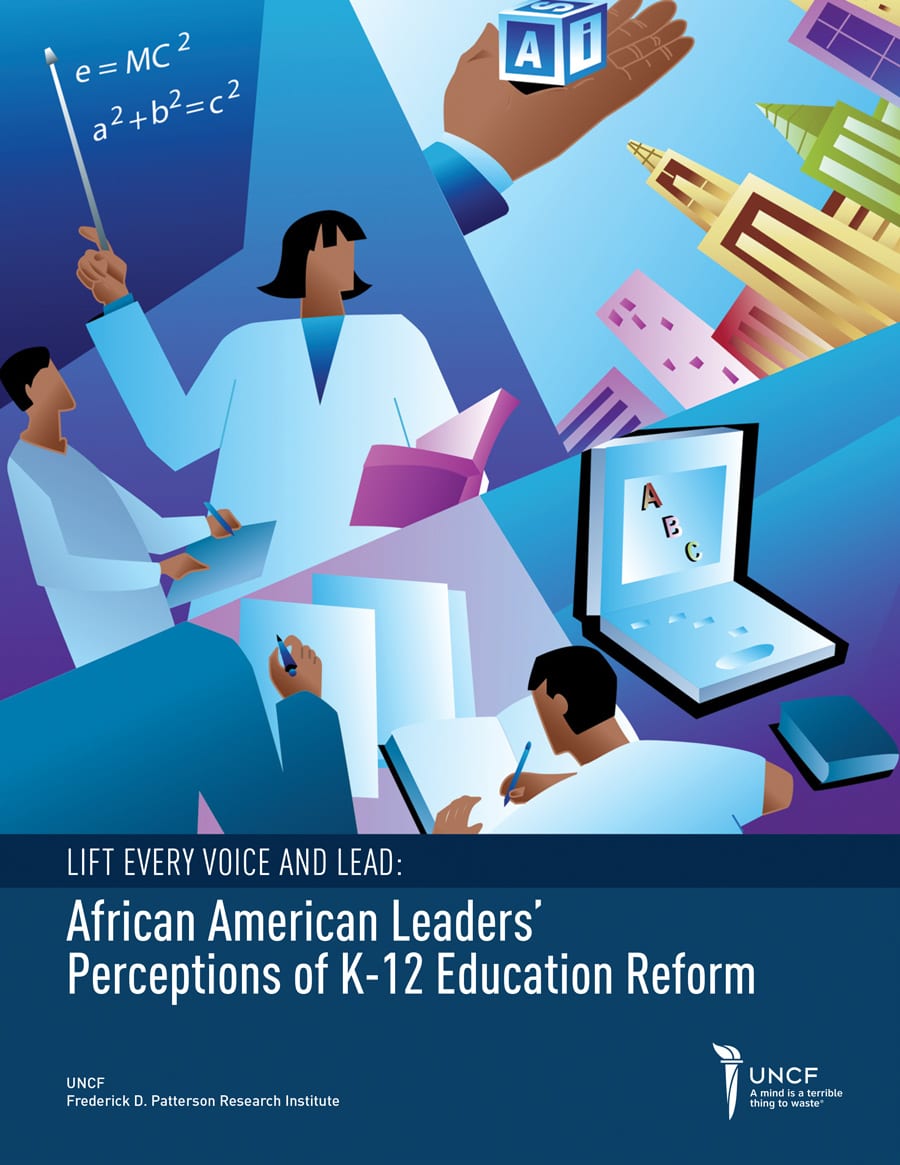African American Leaders Unhappy with K-12 Education System; Eager to Make Changes
New report by the Frederick D. Patterson Research Institute explores African American community leaders’ perspectives on key issues in K-12 education reform
Only three percent of influential black leaders think public schools are preparing black students to attend and graduate from college; however, the majority of leaders are optimistic they can help improve the quality of education for black students, according to a new report issued by UNCF’s Frederick D. Patterson Research Institute (FDPRI).
Lift Every Voice and Lead: African American Leaders’ Perceptions on K-12 Education Reform is the second report in UNCF’s three-part series1 on African American communities’ perspectives of K-12 education. UNCF is giving rise to a more inclusive education reform movement, where African American voices are truly lifted up in both research and advocacy.
“As the Every Student Succeeds Act implementation begins to move forward, there are various ways that black leaders can help shape education reform at the local and state levels,” said Dr. Brian Bridges, co-author of the report and director of FDPRI. “Lift Every Voice and Lead is a call to action for black leaders to use their influence to not only highlight the crisis in education for black youth, but to also find tangible ways to get involved.”

FDPRI researchers analyzed survey and interview data from more than 650 African American community leaders across the country: a group of clergy, local politicians, business leaders and education leaders often described as “grasstops.” As the title suggests, this report urges black grasstops to lift their voices and lead advocacy efforts in the K-12 education space. Although nearly 80 percent of black grasstops feel black leaders in their communities are not doing enough to improve education, the report indicates that many leaders have, in fact, developed community-centered strategies to address disparities in schools—from hosting workshops for students and parents, to engaging with local school board leaders. Furthermore, the study finds that leaders want tools such as talking points, statistics on racial disparities, and advocacy toolkits to support their efforts in improving the quality of education for students.
“The implications of these findings are vast and help challenge assumptions about the lack of engagement of black leaders. Our report suggests that while some leaders think they are not doing enough, the majority sincerely want to make a positive difference in the lives and futures of black students,” said Dr. Meredith B.L. Anderson, lead author of the report.
The report finds that nearly 90 percent of African American community leaders believe they have a strong responsibility to help improve the education that African American students receive and ranked education as the second-highest social policy issue behind the economy/jobs. One grasstop leader interviewed for the report suggested that “the African American community has to stand up and say that we value education and the schools that provide the education, and we are not going to let these assets not provide the kind of high-quality education we think our children need.”
UNCF’s K-12 Advocacy division, which commissioned the report, seeks to amplify a college-going culture, where African American parents are knowledgeable about the college-going process and more African American students are academically prepared for a post-secondary education. Sekou Biddle, vice president for K-12 advocacy at UNCF, explains that grasstops play an integral role in bringing communities together to understand the educational realities black students face.
“These leaders often have long-standing ties to the black community that can help shape their advocacy efforts for black students on the local, state and national level,” Biddle said. “Building better futures for black students is a community-wide effort, and UNCF is working to guide education reform work that embraces collaboration among grasstop and grassroots leaders in the community.”
The report offers four recommendations for community leaders seeking to make improvements in education:
- Expand community networks to further advocacy efforts.
- Provide leaders with the tools to advocate for African American youth.
- Champion the message of positive African American community engagement in education.
- Make the ask for leaders to be involved. Leaders want to see a clear, action-oriented strategy in place.
[1] Done to Us, Not With Us: African American Parent Perceptions on K-12 Education is the first report in this three-part series. The third report, focusing on the voices of African American youth, will be released later in 2017.
View the report’s infographic here
###
About UNCF
UNCF (United Negro College Fund) is the nation’s largest and most effective minority education organization. To serve youth, the community and the nation, UNCF supports students’ education and development through scholarships and other programs, strengthens its 37 member colleges and universities, and advocates for the importance of minority education and college readiness. UNCF institutions and other historically black colleges and universities are highly effective, awarding 20 percent of African American baccalaureate degrees. UNCF annually awards $100 million in scholarships and administers more than 400 programs, including scholarship, internship and fellowship, mentoring, summer enrichment, and curriculum and faculty development programs. Today, UNCF supports more than 60,000 students at more than 1,100 colleges and universities across the country. Its logo features the UNCF torch of leadership in education and its widely recognized trademark, “A mind is a terrible thing to waste.”® Learn more at UNCF.org, or for continuous news and updates, follow UNCF on Twitter, @UNCF and #UNCFk12.